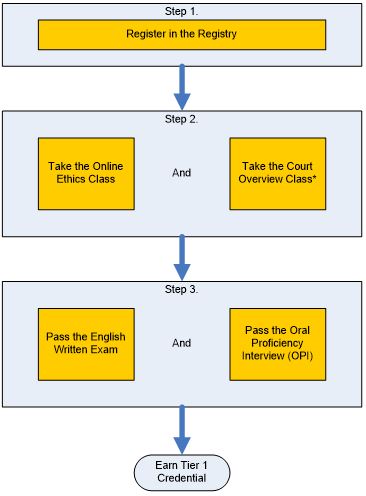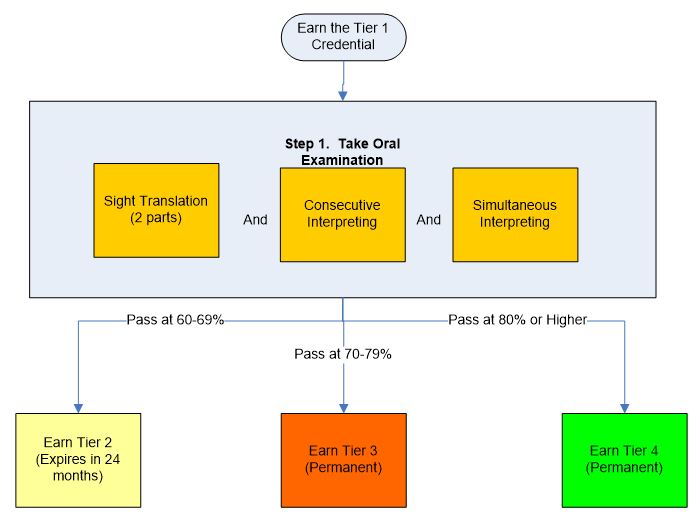On this page...
Earning a credential is an important part of the interpreting profession. The Arizona credentialing program provides an opportunity for interpreters to ensure their skills are at the level necessary to interpret in the courts as well as providing information about their credential to the court community.
The Resources for Interpreters page may be useful for individuals just getting started as a court interpreter or wondering about a career in court interpreting. The work performed by court interpreters is challenging and requires not only strong language skills but also knowledge of the courts, interpreter ethics, and the ability to perform in the various modes of interpreting. The exams required for a credential test all of these areas and interpreters need to study for the exam even if they have years of experience.
All interpreters must complete Tier 1 prior to moving on to the other Tier levels. For interpreters that already hold an interpreting credential from another state, Administrative Office the U.S. Courts (AOUSC) or NAJIT, reciprocity may apply. Please visit our Reciprocity and Transfer of Components page.
Each component of the Arizona credential is offered about two times each year. Locations vary, however the majority of seats for each exam are generally held in Phoenix or Tucson.
Back to Top
Tier 1
All candidates working through the credentialing program in Arizona will begin by completing Tier 1. Only after Tier 1 has been achieved, may an interpreter move on to the other tiers.
Steps to Complete Tier 1
- Registration. The first step towards a Tier 1 credential is to create a profile in the Arizona Court Interpreter Registry. It is critical that a valid email address is provided as this is the method in which the program will communicate with candidates throughout the credentialing process.
- Online Classes. Two online classes are required. One of these is an overview of the Arizona courts, the other covers Interpreter Ethics (Arizona’s Ethical Canons for Interpreters). Both classes must be completed prior to taking any of the tests. The classes require a computer with Internet access, but can be taken from anywhere and at any time. The classes may be taken in either order, but both must be completed prior to signing up for any exams. The court overview class may be waived for those who are currently employed by a court at their supervisor's discretion. Freelance interpreters are not eligible for a waiver. You can register to take these classes here
- Tier 1 Tests. There are two tests required to earn the Tier 1 credential. These may be taken in either order, but passing both is required to earn the credential. Descriptions follow:
- Oral Proficiency Interview. The oral proficiency interview is administered individually. The candidate is required to report to a designated courthouse with a valid U.S. or state government-issued photo ID and then will be interviewed in the language other than English over the telephone. The candidate must pass the oral proficiency interview at an advanced level or higher. More information on the Oral Proficiency Interview can be found here, and scheduling information can be found here. The registration form can be found here.
- English Written Exam. The English written exam is administered to a group of people at the same time. The candidate is required to arrive at the testing location with a valid U.S. or state government-issued photo ID. The candidate must pass the English written exam by answering at least 80% of the questions correctly. More information about the exam can be found here, and the scheduling information can be found here. The registration form can be found here.
Steps to Earn Tier 1 Credential
 |
Tier 1 Achievement
Once a candidate has achieved Tier 1, the candidate will receive a certificate which will be mailed to the address on file in the registry. This is a permanent credential. The status associated with the interpreter in the online interpreter registry will also change to reflect the Tier 1 credential.
Earning a Tier 1 credential permits an individual to go on to higher tiers. Those that have a Tier 1 credential and have sufficient experience are encouraged to sign up for the oral court interpreter exam.
A candidate that is not able to meet the requirements for Tier 1 the first time should carefully consider options to improve language skills prior to signing up to re-take the relevant exam(s).
Back to Top
Upper Tiers (Tiers 2 through 4)
Candidates that have achieved a Tier 1 credential are encouraged to sit for the Oral Court Interpreter Exam which evaluates interpreting abilities. Tier levels 2 through 4 are not progressive; a candidate's score on the Oral Court Interpreter Exam will determine which tier is earned, as illustrated in the chart below. Candidates should feel confident about their interpreting abilities prior to signing up for the oral court interpreter examination as it evaluates those skills and abilities required of successful interpreters, namely a mastery of both languages and interpreting skills. Candidates contemplating this exam are encouraged to review a self-assessment tool, such as the one provided by the National Center for State Courts, "Qualification for Court Interpreting."
Steps to Complete Upper Tiers (Tiers 2 through 4)
- Complete Tier 1. Before a candidate may take the oral court interpreter examination required for Tiers 2-4, all requirements for Tier 1 must be satisfactorily completed.
- Practice. It is very important that the candidate practice prior to taking the oral court interpreter examination. Some resources and suggested exercises are provided as part of the materials included with the online ethics class. The online ethics class is part of the requirement for Tier 1, so each candidate will have access to these materials before sitting for the oral court interpreter exam.
- Oral Court Interpreter Examination. A candidate must take the oral court interpreter examination in order to achieve upper tier credentials. The schedule of possible dates and locations for the Oral Court Interpreter Exam can be found here. In order to register for the oral court interpreter examination, the candidate will need to fill out a Oral Court Interpreter Exam Registration Request Form. Once the form is received, the Arizona Court Interpreter Credentialing Program will review the application including preferred dates. The candidate will receive an email notification that a seat has been tentatively held pending payment and instructions on how to pay online. After payment, the candidate will receive a confirmation email with specific date, time and location to take the exam.
Each candidate must sit for the entire oral court interpreter examination the first time the exam is taken. The exam has three components: sight translation, simultaneous interpretation and consecutive interpretation.
Oral court interpreter examinations are available for the following languages:
Amharic
Arabic*
Bosnian/ Croatian/ Serbian**
Cantonese
Filipino (Tagalog)
French |
Haitian Creole
Hmong
Khmer
Korean
Mandarin
Polish |
Portuguese
Russian
Somali
Spanish
Turkish**
Vietnamese |
*The oral court interpreter exam in Arabic uses Modern Standard Arabic for the Sight Translation and Simultaneous portions of the exam and offers a choice of either Arabic Egyptian Colloquial OR Arabic Levantine Colloquial for the Consecutive portion.
**This language uses an abbreviated oral court interpreter exam. The abbreviated exam contains a simultaneous exercise (English into the target language) and a test of English proficiency. |
| Steps to Earn Upper Level Tier Credentials
(Tier 1 must be completed first)

|
Scores
Each candidate will receive an email with detailed information regarding the scores of their exam. The email will be sent to the email address in the Arizona Court Interpreter Registry. It is imperative that this email address be kept current by the candidate.
Each Tier level has a scoring requirement. For Sight Translation, neither section's score may be more than five (5) percentage points below the minimum score for a given tier. All three components must reach or exceed the scoring requirements for a tier level. The table below helps illustrate scoring related to the Tier levels.
Examples – For Illustrative Purposes Only
| Sight Translation Score1 |
Consecutive Interpreting Score |
Simultaneous Interpreting Score |
Credential Awarded |
Explanation |
| 45% |
61% |
65% |
Remains at Tier 1 |
One score is below the minimum of 60% |
| 68% |
61% |
72% |
Tier 2 |
All scores are 60% or higher, but only 1 score is over 70% |
| 78% |
75% |
69% |
Tier 2 |
All scores are 60% or higher, but one is below the 70% requirement for Tier 3 |
| 71% |
82% |
75% |
Tier 3 |
All scores are over the minimum threshold of 70% for Tier 3. Only one score is over 80% |
| 85% |
88% |
95% |
Tier 4 |
All scores are over the 80% minimum threshold for Tier 4 |
Back to Top
Tier Achievement
Tier 2 Achievement
Once a candidate has achieved Tier 2, a certificate indicating that the candidate has earned the Arizona Tier 2 credential will be mailed to the address on file in the registry. The certificate will show an expiration date. The Tier 2 credential is a temporary credential. The candidate must re-take the oral court interpreter examination within 24 months and achieve a higher score in order to earn a permanent credential. If allowed to expire, the candidate reverts to a Tier 1 credential.
Tier 3 Achievement
Once a candidate has achieved Tier 3, the candidate will receive a certificate which will be mailed to the address on file in the registry. This is a permanent credential.
Tier 4 Achievement
Once a candidate has achieved Tier 4, the candidate will receive a certificate which will be mailed to the address on file in the registry. This is a permanent credential.
Back to Top
Tier A
The Tier A credential is available to candidates with a working language for which there is no oral court interpreter examination available. To progress beyond Tier 1, the candidate must achieve the highest score available on the Oral Proficiency Interview. Some candidates will achieve the highest score the first time they take the OPI. In this instance, the candidate will receive a Tier A credential ( is not necessary to re-take the OPI). In other circumstances, the candidate will only receive an advanced score the first time they take the OPI. In this situation, the candidate must re-take the OPI until the highest score is achieved in order to earn the Tier A credential.
For information on the OPI, please visit the Oral Proficiency Interview Information page.
Back to Top
1 Combined score on both the English-to-foreign language exercise and the foreign language-to-English exercise. Both sections of Sight Translation must be within five (5) percentage points of a given tier's minimum score requirements. Return